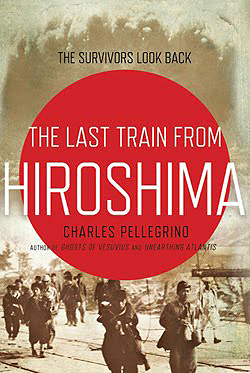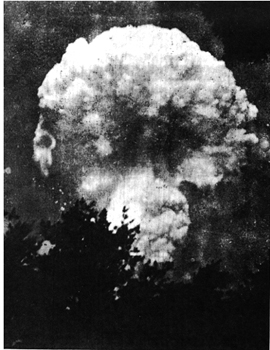When history books lie

“God cannot alter the past, but historians can,” Samuel Butler once dryly noted. Oh Sam, it is worse than alter: they also sensationalize it. True events get embellished in the texts of non-fiction books to the point the term “non-fiction” becomes an oxymoron. One serial practitioner of sensationalized history books is Charles Pellegrino. In books such as Her Name: Titanic, historical figures spout words that are out of character; dubious, unverifiable details are mixed in with facts; and overall his books lack so much serious research they read like Calvin’s half of a report on the planet Mercury he had to do in a Calvin and Hobbes story arc. “I just took a few creative liberties!” Calvin insists to Hobbes afterward. Pellegrino has more or less offered the same defense over the years. But when his 2010 book The Last Train from Hiroshima drew flak, he resorted to another tack: he claimed he was duped by a source and swore he would make changes. He even published this rambling defense on his website. But the book was pulled by the publisher and has fallen into limbo since.
What was the fuss about? Pellegrino makes several sensationalistic claims in the book. First, he claims a radiation accident occurred on the island of Tinian shortly before the Hiroshima mission. An accident he further claims resulted in the death of a civilian scientist. He also claims Enola Gay pilot Paul W. Tibbets got sick from the radiation released during this alleged accident. Suffering from it during the mission to Hiroshima so much he was bedridden for some time after. Pellegrino also claims the “Little Boy” bomb was a “dud” when it was dropped over Hiroshima due to excessive “surge” in the bomb’s plutonium components. These (and other) claims drew this rebuke from the WWII vets of the 509th Composite Bomb Group, to which Tibbets, the Enola Gay, and the other bombers and crews assigned to both Hiroshima and Nagasaki were drawn from. Their rebuttal is %100 proof of the absurdity of these (and other) inventions by Pellegrino they caught.
But some slipped by them. Where Pellegrino did not invent, he simply recycled old tall tales from Hiroshima. For example, he claims some victims from the blast of “Little Boy” had their shadows etched vividly on stone when they were vaporized. This tall tale goes all the way back to the aftermath of the bombing: writer John Hersey mentioned Japanese scientists found a few vague human shadows in the rubble which later gave rise to stories of elaborate human shadows emblazoned on the ruins. I discovered this entirely on my own hook, and later wrote an article about it entitled “Hiroshima: Charles Pellegrino versus the truth.” The veterans of the 509th also did not call out a dubious claim by Pellegrino that in later years Paul Tibbets sometimes got mushroom cloud-shaped birthday cakes on his birthday! That is the first I have ever heard of that. It sounds wildly out of character for the man. And Pellegrino’s claim about Paul Tibbets being remorseful over Hiroshima is wildly off the mark. Listen to how Tibbets talks in this part of the BBC Hiroshima documentary at 3:48. He is not playacting for the camera, either. The 509th veterans vouch for his not having regrets over having flown the mission. In fact, it is almost like Pellegrino embellished further the Hollywood version of Tibbets put out in the movie Above and Beyond, where he is depicted as being remorseful about the bomb even before it is dropped!

Image courtesy Wikimedia.
Why does it matter? What happened at Hiroshima was tragic enough. To waltz in over sixty years later with a book that is a tissue of lies old and new about it only trivializes the event. Those that died that day (and those who took part on the mission) deserve to have the story told straight, without embellishment or sensationalism. And if we have the lessons of Hiroshima and Nagasaki clouded by lies, does that not mean we forget why we should not ever used nuclear weapons ever again? I believe it does.
And speaking of trivializing Hiroshima, it was also reported around the time Last Train appeared that Pellegrino’s friend James Cameron had optioned the movie rights. The controversy did not faze him for long, either, as Cameron claimed he still wanted to make the movie. In this article he even defended Pellegrino by saying ““All I know is that Charlie would not fabricate, so there must be a reason for the misunderstanding.” Some defense, “Jim”, coming as it does from a man who distorted and warped the saga of the Titanic on the silver screen and then grandstanded at the Oscars as his turkey won award after award.
James Cameron make a movie about the bombing of Hiroshima? Him?! As the Ouija Board once said to Calvin in another Calvin and Hobbes comic strip: “G-o-d … f-o-r-b-i-d.” Pellegrino insulted the memory of Hiroshima enough with the groundless sensational fictions he wove into his book. An even more twisted version of the truth done by James Cameron a la his overpraised disaster/chick flick better entitled Two Teen Lovers at Sea would only add further insult to the memory of Hiroshima. We don’t need a scenery-chomping, sex and special effects-addled tissue of lies about what happened on August 6th, 1945, hitting movie screens now, tomorrow, or ever. Especially when they are based on books as dubiously researched as The Last Train from Hiroshima.
Main image courtesy Wikimedia.
0 comments